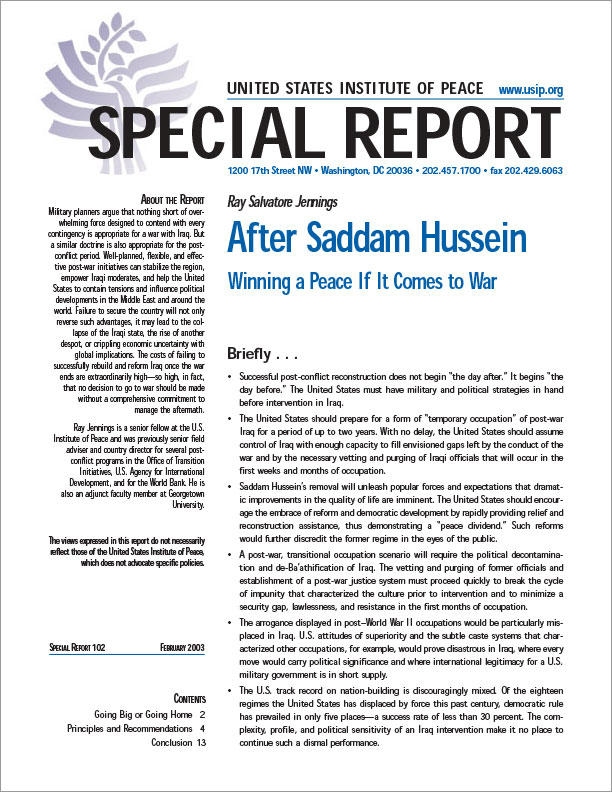After Saddam Hussein: Winning a Peace If It Comes to War
Military planners argue that nothing short of overwhelming force designed to contend with every contingency is appropriate for a war with Iraq. But a similar doctrine is also appropriate for the post-conflict period.

Summary
- Successful post-conflict reconstruction does not begin "the day after." It begins "the day before." The United States must have military and political strategies in hand before intervention in Iraq.
- The United States should prepare for a form of "temporary occupation" of post-war Iraq for a period of up to two years. With no delay, the United States should assume control of Iraq with enough capacity to fill envisioned gaps left by the conduct of the war and by the necessary vetting and purging of Iraqi officials that will occur in the first weeks and months of occupation.
- Saddam Hussein's removal will unleash popular forces and expectations that dramatic improvements in the quality of life are imminent. The United States should encourage the embrace of reform and democratic development by rapidly providing relief and reconstruction assistance, thus demonstrating a "peace dividend." Such reforms would further discredit the former regime in the eyes of the public.
- A post-war, transitional occupation scenario will require the political decontamination and de-Ba'athification of Iraq. The vetting and purging of former officials and establishment of a post-war justice system must proceed quickly to break the cycle of impunity that characterized the culture prior to intervention and to minimize a security gap, lawlessness, and resistance in the first months of occupation.
- The arrogance displayed in post–World War II occupations would be particularly misplaced in Iraq. U.S. attitudes of superiority and the subtle caste systems that characterized other occupations, for example, would prove disastrous in Iraq, where every move would carry political significance and where international legitimacy for a U.S. military government is in short supply.
- The U.S. track record on nation-building is discouragingly mixed. Of the eighteen regimes the United States has displaced by force this past century, democratic rule has prevailed in only five places—a success rate of less than 30 percent. The complexity, profile, and political sensitivity of an Iraq intervention make it no place to continue such a dismal performance.
- The accomplishments of an intervention, particularly one that is unilateral, could easily be subverted by losing the peace. American credibility is on the line. The United States has the resources and the expertise to win the war, but it almost certainly lacks the political will to successfully endure a post-war, multi-year marathon to rebuild Iraq alone. If the United States chooses war, it must summon the will to enlist significant allies, to attain international legitimacy, and to overcome an inborn aversion to nation-building. If not, it should forgo war and pursue other means to resolve the crisis.
About the Report
Military planners argue that nothing short of overwhelming force designed to contend with every contingency is appropriate for a war with Iraq. But a similar doctrine is also appropriate for the post-conflict period. Well-planned, flexible, and effective post-war initiatives can stabilize the region, empower Iraqi moderates, and help the United States to contain tensions and influence political developments in the Middle East and around the world. Failure to secure the country will not only reverse such advantages, it may lead to the collapse of the Iraqi state, the rise of another despot, or crippling economic uncertainty with global implications. The costs of failing to successfully rebuild and reform Iraq once the war ends are extraordinarily high—so high, in fact, that no decision to go to war should be made without a comprehensive commitment to manage the aftermath.
Ray Jennings is a senior fellow at the U.S. Institute of Peace and was previously senior field adviser and country director for several post-conflict programs in the Office of Transition Initiatives, U.S. Agency for International Development, and for the World Bank. He is also an adjunct faculty member at Georgetown University.
The views expressed in this report do not necessarily reflect those of the United States Institute of Peace, which does not advocate specific policies.



